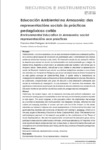Mostrar o rexistro simple do ítem
Educación ambiental na Amazonía: das representacións sociais ás prácticas pedagóxicas cotiás
| dc.contributor.author | Rodrigues de Andrade, Francisca Marli | |
| dc.date.accessioned | 2019-03-11T12:42:10Z | |
| dc.date.available | 2019-03-11T12:42:10Z | |
| dc.date.issued | 2014 | |
| dc.identifier.citation | Ambientalmente Sustentable, 2014, 18: 49-64. ISSN: 1887-2417 | es_ES |
| dc.identifier.issn | 1887-2417 | |
| dc.identifier.uri | http://hdl.handle.net/2183/22162 | |
| dc.description.abstract | [Resumo] Históricamente, o contexto amazónico, con as súas memorias de resistencia e contestación política, foi e continua sendo espazo de construción de posibilidades para o enfrentamento dos diversos problemas ambientais impostos a esta rexión. Os imaxinarios sociais de súa poboación reflicten as relacións que emerxen en función da biodiversidade e da multiculturalidade que a integra. Da mesma forma, resignifica a cultura local e as prácticas cotiás das mulleres e dos homes que na Amazonia habitan. Neste sentido, intensifícase o noso interese en (re)coñecer as representacións sociais da Educación Ambiental que orientan as prácticas pedagóxicas escolares e comunitarias dos docentes, con formación en Pedagoxia, que actuan nas etapas iniciais do Ensino Fundamental na rede pública municipal de Castanhal-Pará, Brasil. O aporte teórico e metodolóxico da investigación foi orientado polas contribuicións da Teoria das Representacións Sociais. Recorremos ao cuestionario, complementado polo grupo de discusión e pola observación participante para recoller as informacións da investigación, na cual participaron 121 docentes. Nos resultados máis significativos evidenciamos as principais vias de acesso ao discurso ambiental e as concepcións de Educación Ambiental que orientan as prácticas cotiás dos protagonistas da investigación | es_ES |
| dc.description.abstract | [Abstract] Historically, the Amazon region, with its resistance memories and political contestation, was and remains building space of possibilities to face the many environmental problems imposed on this region. The social imaginary of the population reflect the relationships that emerge as a function of biodiversity and multiculturalism that integrates. Similarly, reframes the local culture and everyday practices of women and men who live in the Amazon. In this sense, intensifies our interest in (re)know the social representations of Environmental Education that guide teaching practices and community of teachers with training in pedagogy, which act in the early stages of Elementary Education at Public Castanhal-Pará, Brazil. The theoretical and methodological approach of the research was guided by the contributions of the Theory of Social Representations. We used the questionnaire, complement the discussion group and by participant observation to collect survey informatio , which was attended by 121 teachers. In the most significant results evidenced the main access roads to the environmental discourse and conceptions of environmental education that guide the daily practices of research protagonists | es_ES |
| dc.language.iso | glg | es_ES |
| dc.publisher | Universidade da Coruña, Servizo de Publicacións | es_ES |
| dc.rights | Atribución-CompartirIgual 3.0 España | es_ES |
| dc.rights.uri | http://creativecommons.org/licenses/by-sa/3.0/es/ | * |
| dc.subject | Educación ambiental | es_ES |
| dc.subject | Representacións sociais | es_ES |
| dc.subject | Amazonia | es_ES |
| dc.subject | Environmental education | es_ES |
| dc.subject | Social representation | es_ES |
| dc.title | Educación ambiental na Amazonía: das representacións sociais ás prácticas pedagóxicas cotiás | es_ES |
| dc.title.alternative | Environmental education in Amazonia: social representacións ace practices | es_ES |
| dc.type | info:eu-repo/semantics/article | es_ES |
| dc.rights.access | info:eu-repo/semantics/openAccess | es_ES |
| UDC.journalTitle | AmbientalMente Sustentable: Revista científica galego-lusófona de educación ambiental | es_ES |
| UDC.volume | 14 | es_ES |
| UDC.startPage | 49 | es_ES |
| UDC.endPage | 64 | es_ES |
| dc.identifier.doi | https://doi.org/10.17979/ams.2014.02.018.793 |






